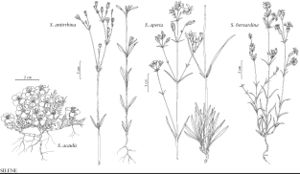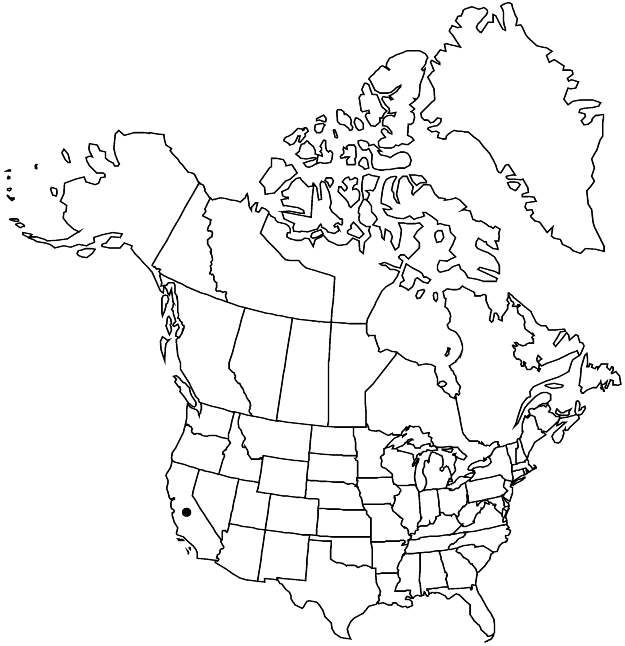Difference between revisions of "Silene aperta"
Leafl. Bot. Observ. Crit. 1: 75. 1904.
FNA>Volume Importer |
imported>Volume Importer |
||
| (5 intermediate revisions by one other user not shown) | |||
| Line 8: | Line 8: | ||
}} | }} | ||
|common_names=Naked catchfly | |common_names=Naked catchfly | ||
| + | |special_status={{Treatment/ID/Special_status | ||
| + | |code=F | ||
| + | |label=Illustrated | ||
| + | }}{{Treatment/ID/Special_status | ||
| + | |code=E | ||
| + | |label=Endemic | ||
| + | }} | ||
|basionyms= | |basionyms= | ||
|synonyms= | |synonyms= | ||
| Line 24: | Line 31: | ||
|elevation=1800-3000 m | |elevation=1800-3000 m | ||
|distribution=Calif. | |distribution=Calif. | ||
| − | |discussion=<p>A deeply lobed calyx and grasslike leaves give Silene aperta a very distinct appearance. The species is found only in Tulare County.</p> | + | |discussion=<p>A deeply lobed calyx and grasslike leaves give <i>Silene aperta</i> a very distinct appearance. The species is found only in Tulare County.</p> |
|tables= | |tables= | ||
|references= | |references= | ||
| Line 33: | Line 40: | ||
-->{{#Taxon: | -->{{#Taxon: | ||
name=Silene aperta | name=Silene aperta | ||
| − | |||
|authority=Greene | |authority=Greene | ||
|rank=species | |rank=species | ||
| Line 47: | Line 53: | ||
|publication title=Leafl. Bot. Observ. Crit. | |publication title=Leafl. Bot. Observ. Crit. | ||
|publication year=1904 | |publication year=1904 | ||
| − | |special status= | + | |special status=Illustrated;Endemic |
| − | |source xml=https:// | + | |source xml=https://bitbucket.org/aafc-mbb/fna-data-curation/src/2e0870ddd59836b60bcf96646a41e87ea5a5943a/coarse_grained_fna_xml/V5/V5_344.xml |
|subfamily=Caryophyllaceae subfam. Caryophylloideae | |subfamily=Caryophyllaceae subfam. Caryophylloideae | ||
|genus=Silene | |genus=Silene | ||
Latest revision as of 22:10, 5 November 2020
Plants perennial, cespitose, puberulent throughout; caudex woody, branched, with clusters of leaves. Stems several, erect, not much-branched, slender, 15–60 cm, flowering above middle. Leaves: cauline in 2–4 pairs, gradually reduced distally, blade linear with broadened base, 1–8 cm × 1–2 mm, apex acute; basal leaves tending to wither by flowering time, blade with midrib present, linear-oblanceolate, 5–12 cm × 1–4 mm, apex acute. Inflorescences few-flowered, bracteate, narrow, flowers terminal and axillary; bracts linear, 2–10 mm. Pedicels ascending, straight, slender, very short in bud but equaling or exceeding flower at anthesis. Flowers: calyx 10-veined, campanulate, lobed to middle or below, 6–10 mm; lobes 6, recurved, 1–3-veined, lanceolate to linear-lanceolate, margins membranous, ciliate, apex acute; petals white to pale greenish, lobed, clawed, 12–20 mm including claw, ca. 2 times length of calyx; lobes 4, small, 1.5–2 mm, claw woolly towards base, appendages absent; stamens equaling petals; filaments pubescent at base; styles 3, shorter than to equaling stamens. Capsules ovoid, exceeding calyx, dehiscing with 6 spreading teeth; carpophore 1–2 mm. Seeds brown, broadly reniform, less than 1.75 mm, margins coarsely tuberculate to papillate, with concentric rings of tubercles on both faces. 2n = 48.
Phenology: Flowering Jun–Sep.
Habitat: Open, grassy areas in fir and pine forests
Elevation: 1800-3000 m
Discussion
A deeply lobed calyx and grasslike leaves give Silene aperta a very distinct appearance. The species is found only in Tulare County.
Selected References
None.

